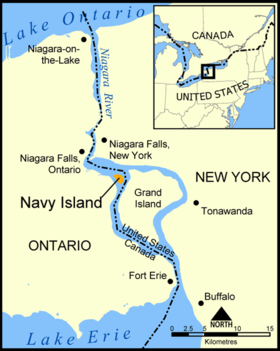Republic of Canada
| Republic of Canada | ||||||||||
| Unrecognized state | ||||||||||
|
||||||||||
|
Republic of Canada in North America in 1837.
|
||||||||||
|
Navy Island
|
||||||||||
| Capital | Navy Island | |||||||||
| Languages | English | |||||||||
| Government | Republic | |||||||||
| President | ||||||||||
| • | 1837–1838 | William Lyon Mackenzie | ||||||||
| Historical era | Upper Canada Rebellion | |||||||||
| • | Republic declared | 17 December 1837 | ||||||||
| • | Republic collapses | 4 December 1838 | ||||||||
|
||||||||||
The Republic of Canada was a government proclaimed by William Lyon Mackenzie on December 5, 1837. The self-proclaimed government was established on Navy Island in the Niagara River in the latter days of the Upper Canada Rebellion.
In the latter days of the Rebellions of 1837 in Upper Canada, after Mackenzie and 200 of his followers retreated from Toronto to Navy Island, he declared a separate republic. He established an independent currency, and supplied his camp using the American supply steamer Caroline. He recruited followers by promising 300 acres (120 ha) of land to any man that supported his cause. He later included in his promise $100 in silver to his supporters, payable on May 1, 1838.
On December 29, Royal Navy Commander Andrew Drew and seven boatloads of Canadian militiamen crossed the Niagara River to Fort Schlosser. They captured the Caroline used by William Lyon Mackenzie and his rebels on Navy Island. Drew's forces set the ship alight and sent it adrift towards Niagara Falls, resulting in the death of one American. It was falsely reported that dozens of Americans were killed as they were trapped on board, and U.S. soldiers retaliated by burning a British steamer while it was in U.S. waters, triggering what became known as the Caroline affair.
On January 13, 1838, Mackenzie abandoned Navy Island under heavy fire from British troops. He and his force retreated to Buffalo, New York, where they were captured by the U.S. army and sentenced in the U.S. to 18 months' imprisonment for violating neutrality laws between the United States and the British Empire, ending the prospect of a successful Canadian declaration of independence and what the British viewed as an inconsequential and unsupported colonial rebellion.
...
Wikipedia



